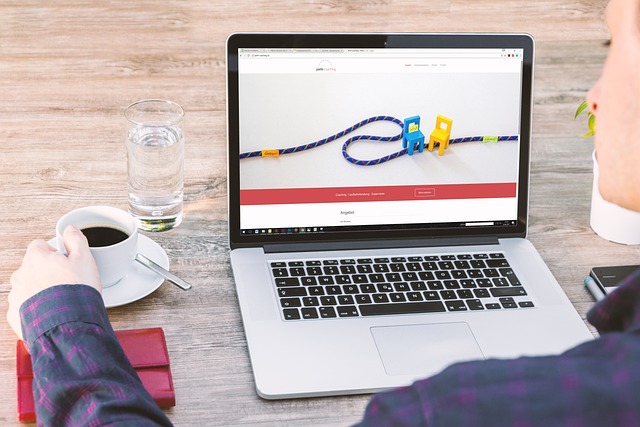Small businesses need specialized web design services that cater to their unique requirements, focusing on marketing, sales, and customer engagement. Professional web designers create visually appealing sites with streamlined purchasing, effective product showcasing, valuable resources, and conversion drives. These websites boost brand visibility, contribute to growth, and thrive in the digital landscape. When hiring, prioritize designers with a proven track record, adaptability, responsive design expertise, and content management system proficiency. Key features include user-friendly interfaces, clear calls to action, SEO optimization, high-quality visuals, fast loading times, and regular content updates. Effective communication and long-term relationships are crucial for achieving website goals without exceeding budgets.
Small businesses in today’s digital landscape need more than just a basic website; they require reliable web designers who understand their unique needs. A professional, well-designed website is a powerful tool for boosting growth, increasing visibility, and building credibility.
This guide navigates the process of finding suitable small business web designers, from identifying key qualities to choosing between custom designs and templates. It offers insights on essential website features, cost-effective solutions, and effective collaboration tips, ensuring your online presence reflects your brand’s potential.
Understanding the Unique Needs of Small Businesses

Small businesses often have distinct and unique requirements when it comes to their online presence, which sets them apart from larger corporations. Engaging the services of a specialized small business web designer is a strategic move for several reasons. These designers are adept at crafting websites that cater specifically to the goals and challenges faced by smaller enterprises.
They understand that a website isn’t just an online brochure but a powerful tool for marketing, sales, and customer engagement. For instance, a well-designed site can streamline the purchasing process, showcase products or services effectively, and provide valuable resources for customers. By considering these specific needs, small business web designers create websites that not only look appealing but also drive conversions, enhance brand visibility, and ultimately contribute to the success and growth of the business.
The Impact of a Professional Website on Business Growth

A professional website is no longer a luxury for businesses; it’s an absolute necessity. In today’s digital era, having an online presence is crucial for small businesses to thrive and compete in the market. A well-designed site acts as a virtual storefront, providing 24/7 accessibility to potential customers worldwide. It offers a platform to showcase products or services, share valuable content, and build brand identity. Small business web designers play a pivotal role in creating these digital assets, ensuring they are not just visually appealing but also optimized for search engines, thereby driving organic traffic.
A reliable web designer understands the unique needs of small businesses and tailors their designs to reflect the brand’s personality and values. This personalized approach results in a website that effectively communicates the business’s mission, engages visitors, and ultimately boosts sales. With a professional site, small businesses can establish themselves as credible entities, enhance customer relationships, and create opportunities for expansion—all of which contribute to long-term growth and success.
Identifying Reliable Web Designers: Key Qualities and Expertise

When seeking reliable web designers for your small business, it’s crucial to identify professionals who possess a combination of key qualities and expertise. Look for designers with a proven track record in creating user-friendly, visually appealing, and search engine optimized websites tailored for small businesses. Their portfolio should showcase diverse projects, demonstrating adaptability and a deep understanding of various industries.
In terms of expertise, seek out designers well-versed in responsive design, ensuring your website adapts seamlessly to all devices. Proficiency in content management systems (CMS) like WordPress or Shopify is also essential, allowing for easy updates and content changes without extensive coding knowledge. Effective communication, timely project delivery, and a customer-centric approach are additional qualities that set apart truly reliable small business web designers.
Customization vs. Templates: What's Best for Small Businesses?

When it comes to creating a website for your small business, one key consideration is whether to opt for customization or use templates. Small business web designers often face this dilemma as both approaches have their advantages and disadvantages. Customization allows for a unique design tailored specifically to your brand, target audience, and business needs. It ensures that your site stands out, reflects your company’s identity, and provides a seamless user experience. However, it can be more time-consuming and expensive, requiring skilled designers and potentially pushing up project timelines.
On the other hand, using templates offers a faster and more budget-friendly option. Pre-designed templates provide a ready-made foundation for your website, with various styles and layouts to choose from. Small businesses can quickly launch their online presence by selecting a template that aligns with their industry or preferences. This approach saves time but may result in a less distinctive site that could be similar to competitors or other websites using the same template. Therefore, small business owners should weigh the benefits of customization versus templates based on their resources, desired level of uniqueness, and overall marketing goals.
Essential Features Every Small Business Website Should Have

When it comes to crafting a website for your small business, there are several essential features that every site should incorporate to ensure its effectiveness and appeal to target audiences. Engaging and reliable small business web designers understand this and tailor their services to meet these critical requirements. Firstly, a user-friendly interface is paramount. Websites should be designed with intuitive navigation, clear calls to action, and responsive layouts that adapt seamlessly across various devices, from desktops to smartphones.
Additionally, search engine optimization (SEO) is crucial for online visibility. Incorporating relevant keywords, meta descriptions, and structured data helps small business websites rank higher in search results, driving organic traffic. Fast loading times, high-quality visuals, and regular content updates also contribute to a positive user experience, fostering engagement and encouraging conversions.
Building Trust and Credibility Through Website Design

A well-designed website is more than just an online representation; it’s a powerful tool to build trust and credibility for your small business. When potential customers land on your site, they instinctively judge its quality and professionalism, which significantly impacts their initial impression of your brand. Engaging services from reliable small business web designers can make all the difference.
These designers understand that a website isn’t merely static content; it should reflect your unique value proposition and foster trust. Through strategic design elements, such as clear navigation, high-quality visuals, and engaging copy, they create digital spaces that resonate with visitors. By ensuring your site is secure, mobile-responsive, and optimized for search engines, these professionals enhance your online presence, making your small business appear more legitimate and trustworthy in the eyes of potential clients.
Cost-Effective Solutions: Balancing Quality and Budget

When it comes to creating a website for your small business, cost-effective solutions are essential. Many small businesses have limited budgets but still require high-quality web designs to compete in today’s digital market. The key is to find reliable web designers who understand this balance and can deliver exceptional results without breaking the bank.
Small business web designers should offer tailored packages that suit various budget constraints while ensuring each website is unique, visually appealing, and optimized for search engines. By choosing a designer who prioritizes long-term relationships and open communication, you can ensure they’ll work with you to achieve your goals efficiently and affordably.
Tips for Collaborating Effectively with Your Web Designer

When collaborating with a web designer for your small business, clear communication is key. Set regular check-ins to discuss progress and share your vision for the website. Be prepared to provide detailed feedback on design elements, functionality, and content. Remember that your web designer is there to bring your ideas to life, so offer specific instructions while also allowing room for their creative input.
Additionally, maintain an open line of communication regarding timelines and budget. Small business web designers often work with tight deadlines and limited resources, so understanding your expectations and constraints from the outset will help ensure a smooth process. Regularly review project updates and be transparent about any changes needed to stay aligned with your goals.
